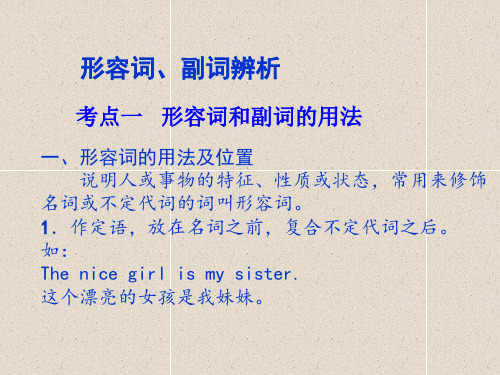英语人教版2014中考考点精讲课件(语法篇) 形容词和副词
合集下载
人教版初中英语语法知识学习课件PPT之形容词和副词语法学习PPT

形容词和副词最高级的用法 最高级用于三者或三者以上人或事物的比较。在最高级的句型中常用由among,in 或of构成的介词短语来指出比较范围。形容词最高级前通常加定冠词the,副词最高级前一般不加定冠词。
1.
A+谓语动词 (+the)+最高级(+名词)+in/of 短语
表示"A是……中最……的"。如:·Tom studies hardest in our class, so he often gets first place in the exam.·He is the greatest player of the group.2.
Traditional
5.[2022温州中考改编] Everybody, please keep ________. It’s not allowed to make any noise in the reading room.
形容词和副词语法学习
图解语法
考点 1 形容词
形容词的用法
1.作表语,位于系动词后。如:·The dish you made looks so nice.·Students are busy writing without talking, so the classroom is quiet.[2022广西北部湾经济区中考]
形容词和副词比较级的用法1.
A+谓语动词+比较级+than+B
表示"A比B更……"。如:He works harder than us.
2.
A+谓语动词+less+形容词/副词原级+than+B
表示"A不如B……" 。如:This red dress is less expensive than the blue one.
1.
A+谓语动词 (+the)+最高级(+名词)+in/of 短语
表示"A是……中最……的"。如:·Tom studies hardest in our class, so he often gets first place in the exam.·He is the greatest player of the group.2.
Traditional
5.[2022温州中考改编] Everybody, please keep ________. It’s not allowed to make any noise in the reading room.
形容词和副词语法学习
图解语法
考点 1 形容词
形容词的用法
1.作表语,位于系动词后。如:·The dish you made looks so nice.·Students are busy writing without talking, so the classroom is quiet.[2022广西北部湾经济区中考]
形容词和副词比较级的用法1.
A+谓语动词+比较级+than+B
表示"A比B更……"。如:He works harder than us.
2.
A+谓语动词+less+形容词/副词原级+than+B
表示"A不如B……" 。如:This red dress is less expensive than the blue one.
中考英语语法讲解课件-形容词与副词

• • • •
Do you want to have some bread? Do you want to have any bread? [2误] [析] some与any都可以用作形容词、副 词或代词,在一般情况下,some用于肯定 句,any用于疑问句和否定句,但在希望得 到肯定答复时,应用some。 其次是some 可以用来修饰可数名词和不可数名词。
• • • •
I'm tired. I can't go further. I'm tired. I can't go farther. [1误] [析] far有两个比较级 farther 较远的, further 进一步的,如:Do you need any further explanation? 你需要进一步的解释 吗?当然它也有两个最高级。farthest和 furthest.
• I went to Beijing University five years ago. • I went to Beijing University five years before. • [2误] • [析] ago常与过去时连用,而before则多 与完成时连用。
• • • • • •
好的问题
• • • • • • • • Good—well---kind adj 善良的; Sb be good at某人擅长做 Sb do well in某人擅长做 Sb be kind to sb某人对另外一个人好 例:It is very kind __ you to help me. Of/ to/ for The __ lady is __ to her grandchildren Kind; well/ well; kind/ good; kind/ kind; kind
中考英语语法大全——形容词和副词(共22张PPT)

C. 特殊疑问词+ ...+the+形容词/副词最高级 表示“......最......”。 Which country is the largest, China, American or Canada? Which season do you like the best, spring, summer or autumn?
(2) 比较级的用法
A. 形容词/副词比较级+than 表示一方超过或低于另一方的情况, 意为“......高于或低于......”。 Li Ming jumped farther than Wang Lin. The car is running less smoothly than it used to. B. 形容词/副词比较级+ and+形容词/副词比较级,表示事物本身 程度的逐渐变化,意为“越来越......”。 The day is getting longer and longer. The fire spread further and further with the wind blowing more and more strongly.
(4) 比较级和最高级的修饰语
A. 比较级的修饰语 修饰比较级的常用词和短语有 even still much a little a lot a bit far by far rather Could you please speak a little more slowly so that I can follow you. You handwriting is by far better than mine. The task provided to be rather more difficult than I had expected. B. 最高级的修饰语 常用的最高级的修饰与有序数词以及以下各词 by far much almost nearly far and away This is by far the best book that I have ever read. Of all the students, Jack's oral English is almost the best.
中考英语专题复习形容词、副词比较级、最高级复习ppt课件

的词叫副词。副词在句中多作状语.
二、形容词和副词的用法
①形容词作定语一般放在被修饰的名
词之前。
如: a new book, two big trees 等。 ②形容词放在系动词be 、look 、sound 、 smell 、taste 、feel 、seem 等之后。 如:1.I am short.
④副词放在所修饰的动词之后、形容词和副词之前。 如: 1.She works hard . (修饰动词)
2 . He runs fast. ( 修 饰 动 词 ) 3 . I jump high. ( 修 饰 动 词 )
4. We play happily. (修饰动词) 5.I am very busy. (修饰形容词) 6.He runs too quickly . (修饰副词)
It seems to be flying. (fast)
5.表示一方不及另一方时,使用“less+原级+than+…”
“不如 · · · ”
I am less hard working than you.
6. Who/Which +谓语+比较级,A or B? “A/B谁/哪个更…?”
Which do you like better , Math or English?
原级 important easy thin good well hot expensive cheap many little
比较级
最高级
more important most important
easier
easiest
thinner better
thinnest best
better
best
二、形容词和副词的用法
①形容词作定语一般放在被修饰的名
词之前。
如: a new book, two big trees 等。 ②形容词放在系动词be 、look 、sound 、 smell 、taste 、feel 、seem 等之后。 如:1.I am short.
④副词放在所修饰的动词之后、形容词和副词之前。 如: 1.She works hard . (修饰动词)
2 . He runs fast. ( 修 饰 动 词 ) 3 . I jump high. ( 修 饰 动 词 )
4. We play happily. (修饰动词) 5.I am very busy. (修饰形容词) 6.He runs too quickly . (修饰副词)
It seems to be flying. (fast)
5.表示一方不及另一方时,使用“less+原级+than+…”
“不如 · · · ”
I am less hard working than you.
6. Who/Which +谓语+比较级,A or B? “A/B谁/哪个更…?”
Which do you like better , Math or English?
原级 important easy thin good well hot expensive cheap many little
比较级
最高级
more important most important
easier
easiest
thinner better
thinnest best
better
best
中考英语(人教版)语法专题形容词和副词 (共138张PPT)

10.形容词原级用法 (1)说明人或事物自身的特征、性质或状态时用形容词原级。 The pictures on the wall are nice. 墙上的图片很漂亮。 (2)有表示绝对概念的副词 very, so, too, enough, quite 等 修饰时用形容词原级。 The man is very tall. 这个人很高。 (3)表示 A 与 B 在某一方面程度相同或不同时用形容词原级。 ①肯定句中的结构: A ...+ as+形容词原级+ as+B. English is as important as Chinese. 英语和中文一样重要。
(3) 表 示 两 者 之 间 进 行 选 择 “ 哪 一 个 更 ……” 时 , 用 句 型 “ Which/Who is+形容词比较级, A or B?”表示。 Which book is newer, this one or that one? 哪本书更新一些,这本还是那本? (4)表示“几倍于……”时, 用“倍数+比较级+than”表示。 Her house is twice bigger than mine. 她的房子比我的大两倍。 (5)表示“两者之间较……的一个”时,常用“ the+比较级+ of the two... ”结构。 Tom is the taller of the two boys. 汤姆是这两个男孩中较高的一个。
9.形容词比较等级的构成:原级、比较级和最高级 (1)规则变化
类别 构成方法
一般在词尾加er, est 单音 节词 和部 分双 音节 词 以不发音的字母e结尾的 词,加r,st
原
级
比较级
newer taller later finer easier happier thinner hotter
中考英语专题-形容词、副词复习课件【优质PPT】

I am not so fast as lucy.我没有露西快。
考 点 训 练
2021/10/10
目录
10
首 页 上一页 下一页 末 页
宇轩图书
考
点
解 读
13.形容词比较级用法
(1)表示两者进行比较时用形容词比较级,其结构为“A...+比较级+
考 点
than+B”。
知
The oranges in this bag are bigger than those in that bag.
例 精
(3)表示两者之间进行选择“哪一个更……”时,用句型“Which/Who
析 is+形容词比较级,A or B?”表示。
Which book is newer,this one or that one?
考 点
哪本书更新一些,这本还是那本?
训
练
2021/10/10
目录
11
首 页 上一页 下一页 末 页
考
李雷比班上其他所有的学生都高。
点 训
=Li Lei is taller_than anyone else in his class.
练
李雷比班上其他任何人都高。
2021/10/10
14
目 录 首 页 上一页 下一页 末 页
宇轩图书
考 点 解 读
4.副词比较等级用法
考
(1)副词的比较级、最高级的变法和形容词的比较级、最高级变法基本
精
玛丽的字在三个女孩中是物进行选择时,用“Which/Who
中
is+the+最高级,A,B or C?”结构。
考 典
Who is the oldest,Mary,Nancy or Lily?
初中英语语法——形容词和副词 课件(共18张ppt)

F. 连接副词: how, when, where, why, whether, however, meanwhile G.程度副词: almost, nearly, very, fairly, quite, rather
H.关系副词: when, where, why
作状语,用来修饰 动词、形容词、其 他副词和句子。 作宾语 补足语 作表语,表示方 位上的变化。
1. 一般作状语时放在谓语动词之后。如果谓 语动词带有宾语,副词则放在宾语后面。 2. 频度副词作状语时放在be动词或助动词、 情态动词之后,行为动词之前。 3. 某些副词为了强调上下句的衔接,放在句 子之前。 4. enough修饰形容词和副词时,要放在所修 饰词之后。
原级
比较级
最高级
1.讲述某人/物自身的情况时,用原级。基本句型是:
① 表示三者或三者以上的人或物进行比较时,用最高级形式。形容词最高级前必须加定冠词the,
句末常跟一个in/ of短语来表示范围。
② 表示在三者或三者以上的人或物进行选择时,用 “Which/ Who is + the + 最高级,A,B or C?”结构。 ③ 表示“最……的……之一”时,用“one of the +形容词最高级”结构,该形容词后面的名词要用 复数形式。 ④ 形容词最高级前面可以加序数词,表示“第几最……”。 ⑤ 形容词最高级前面可以有物主代词,指示代词,名词所有格等修饰,但此时不能再用定冠词the。
a)直接加er,est : b)以重读闭音节结尾的,要双写最后一个辅音字母,后加er,est: c)以辅音字母+y结尾的,先把y改为i再加上er,est:
2.规则变化: (2)两个音节或两个以上的音节的,在原级前加more / most.
H.关系副词: when, where, why
作状语,用来修饰 动词、形容词、其 他副词和句子。 作宾语 补足语 作表语,表示方 位上的变化。
1. 一般作状语时放在谓语动词之后。如果谓 语动词带有宾语,副词则放在宾语后面。 2. 频度副词作状语时放在be动词或助动词、 情态动词之后,行为动词之前。 3. 某些副词为了强调上下句的衔接,放在句 子之前。 4. enough修饰形容词和副词时,要放在所修 饰词之后。
原级
比较级
最高级
1.讲述某人/物自身的情况时,用原级。基本句型是:
① 表示三者或三者以上的人或物进行比较时,用最高级形式。形容词最高级前必须加定冠词the,
句末常跟一个in/ of短语来表示范围。
② 表示在三者或三者以上的人或物进行选择时,用 “Which/ Who is + the + 最高级,A,B or C?”结构。 ③ 表示“最……的……之一”时,用“one of the +形容词最高级”结构,该形容词后面的名词要用 复数形式。 ④ 形容词最高级前面可以加序数词,表示“第几最……”。 ⑤ 形容词最高级前面可以有物主代词,指示代词,名词所有格等修饰,但此时不能再用定冠词the。
a)直接加er,est : b)以重读闭音节结尾的,要双写最后一个辅音字母,后加er,est: c)以辅音字母+y结尾的,先把y改为i再加上er,est:
2.规则变化: (2)两个音节或两个以上的音节的,在原级前加more / most.
中考英语语法专项复习:形容词和副词 课件(共73张ppt)

形容词、副词辨析
考点一 形容词和副词的用法
一、形容词的用法及位置 说明人或事物的特征、性质或状态,常用来修饰 名词或不定代词的词叫形容词。 1.作定语,放在名词之前,复合不定代词之后。 如: The nice girl is my sister. 这个漂亮的女孩是我妹妹。
4.某些形容词可以和定冠词the连用,表示一类人或物。 The old should be taken care of. 老人应该被照顾。 5.形容词修饰复合不定代词或者副词时,后置。 something important somewhere interesting 6.数词+名词+形容词,表示长、宽、高、深及年龄。
2. —These apples look really ______. Are
they popular at the market?
—Yes, they sell ______ all the time.
A. good; good
B. good; well
C. well; good
D. well; well
five thousand kilometers long
7.多个形容词同时修饰一个名词时候的顺序: 限定词( 冠词、指示代词、形容词性物主代词、名次所有 格、数词 )+描述 + 形状 ( 大小、长短、高低 )+年龄 / 新旧 + 颜色 + 国籍/地区/出处+材料
She has beautiful long black hair.
-ing(令人……) exciting surprising
-ed(感到) excited surprised
相关短语 be excited about be surprised at
考点一 形容词和副词的用法
一、形容词的用法及位置 说明人或事物的特征、性质或状态,常用来修饰 名词或不定代词的词叫形容词。 1.作定语,放在名词之前,复合不定代词之后。 如: The nice girl is my sister. 这个漂亮的女孩是我妹妹。
4.某些形容词可以和定冠词the连用,表示一类人或物。 The old should be taken care of. 老人应该被照顾。 5.形容词修饰复合不定代词或者副词时,后置。 something important somewhere interesting 6.数词+名词+形容词,表示长、宽、高、深及年龄。
2. —These apples look really ______. Are
they popular at the market?
—Yes, they sell ______ all the time.
A. good; good
B. good; well
C. well; good
D. well; well
five thousand kilometers long
7.多个形容词同时修饰一个名词时候的顺序: 限定词( 冠词、指示代词、形容词性物主代词、名次所有 格、数词 )+描述 + 形状 ( 大小、长短、高低 )+年龄 / 新旧 + 颜色 + 国籍/地区/出处+材料
She has beautiful long black hair.
-ing(令人……) exciting surprising
-ed(感到) excited surprised
相关短语 be excited about be surprised at
人教版中考初中英语形容词和副词精讲PPT课件

(2) old 有两种比较级和最高级形式: older/oldest和elder/eldest。 elder,eldest只用于兄弟姐妹的长幼关系。 e.g. My elder brother is an engineer. Mary is the eldest of the three sisters.
7) many , old 和 far
(1) 如果后接名词时,much more +不可数名词; many more +可数名词复数 e.g. Some students are against the plan, but many more support. 一些同学反对这项计划,但是更多人支持它。 We have many more tomatoes left. The farmers have produced much more rice. She has much more to do.
I bought _a_b_e_a_u_ti_fu_l_l_o_n_g_r_e_d_C_h_i_n_e_se__s_il_k_dress. ( Chinese, a, red, silk, beautiful, long )
(二) 副词及其基本用法
副词主要用来修饰动词,形容词,副词或句子。
1) 副词的位置:
English is widely used in the world.
(6) free与freely
free的意思是“ 免费”;freely 的意思是“无限制地” e.g. You can eat free in my restaurant whenever you like.
You may speak freely; say what you like.
7) many , old 和 far
(1) 如果后接名词时,much more +不可数名词; many more +可数名词复数 e.g. Some students are against the plan, but many more support. 一些同学反对这项计划,但是更多人支持它。 We have many more tomatoes left. The farmers have produced much more rice. She has much more to do.
I bought _a_b_e_a_u_ti_fu_l_l_o_n_g_r_e_d_C_h_i_n_e_se__s_il_k_dress. ( Chinese, a, red, silk, beautiful, long )
(二) 副词及其基本用法
副词主要用来修饰动词,形容词,副词或句子。
1) 副词的位置:
English is widely used in the world.
(6) free与freely
free的意思是“ 免费”;freely 的意思是“无限制地” e.g. You can eat free in my restaurant whenever you like.
You may speak freely; say what you like.
人教版英语中考语法专题形容词和副词课件

注意:
1.new,few,slow,clean等词以重读闭音节结尾, 末尾只有一个辅音字母,且发的是长元音,不用双
写。
2.以形容前缀un构成的三音节形容词不适合上述规 则。
如:unhappy—unhappier—unhappiest,
untidy—untidier—untidiest
注意: 1.修饰形容词和副词原级的词(组)有:really,very,so, too,quite,a little,rather,pretty等。 2.修饰形容词、副词比较级的词(组)有:much,far,a lot ,a little,a bit,even,any等。 3.比较级+than+any other+名词(单数)(比较对象属同一个 范围) 比较级+than+any+名词(单数)(比较对象不属于同一个范 围) 如:China is larger than any other country in Asia.中国比任 何亚洲国家都大。 Shanghai is larger than any city in Shandong.上海比山东任何 一个城市都大。
如:We should respect the old and love the young.我们应该尊 老爱幼。 It's not polite to laugh at the blind or the dea按“外观(评价) 高低、形状等) /
(长短、
(地区、出处等)
料”的顺序排列。
如:a beautiful tall building一栋漂亮而高大的建筑物 a large yellow Chinese coat一件黄色的中式大衣
►考点2:副词
1.Be ____________( 小心) when you cross the street. careful
【人教版】中考英语复习ppt课件:第25讲-形容词和副词

高频考向三
形容词、副词等级的用法
1.形容词、副词比较级和最高级的构成 ①规则变化
②不规则变化 原级 good/well bad/ill/badly little many/much far old 比较级 better worse less more farther older/elder 最高级 best worst least most farthest oldest/eldest
答案:__B__
【例5】—Can you catch what I said? —Sorry.I can ________ understand it.(2014,荆州) A.almost B.probably C.nearly D.hardly 解析:almost“几乎;差不多”;probably“大概;或许”; nearly“几乎;差不多”;hardly“几乎不”。由答语前半句“ 对不起”推知,后半句句意为“我几乎不能理解你说的”。
❷作表语,放在系动词的后面。常见的系动词有be,become, get(变),make(使),turn(变),keep(保持),feel,look(看起来), seem,smell,sound,taste。如:
He looks happy today.他今天看起来很高兴。
Silk feels soft.丝绸摸起来很软。 Milk is able to turn bad easily in summer.夏天,牛奶容易变质。
高频考向二
副词
❶副词按性质和用途可分为时间副词、地点副词、方式副词 、程度副词、疑问副词等。
①时间副词
通常用来表示动作发生的时间。常见的时间副词有now, today,tomorrow,yesterday,before,late,early等。
中考英语专题-形容词、副词复习课件

Our school is becoming more_and_more_beautiful.
考 点
我们的学校变得越来越漂亮了。
训 练
(7)表示“越……就越……”时,用“the +比较级,the+另一比
较级”结构。
The_more we get together, the_目ha录ppier首w页e'll b上e一. 页 下一页 末 页
中 考 典 例 精 析
考 点 训 练
目 录 首 页 上一页 下一页 末 页
宇轩图书
考 点 解 读
考 点 知 识 精 讲
中 考 典 例 精 析
考 点 训 练
目 录 首 页 上一页 下一页 末 页
宇轩图书
考 点 解 读
考 点 知 识 精 讲
中 考 典 例 精 析
考 点 训 练
目 录 首 页 上一页 下一页 末 页
识
这个包里的橘子比那个包里的橘子大。
精
讲
(2)有表示程度的副词 a little,a bit,a few,a lot, much,even,still,
far,rather,any 等修饰时,用形容词比较级。
中 考 典
It is much hotter in Guangdong than that in Jilin. 广东比吉林热得多。
The man is very tall. 这个人很高。
(3)表示 A 与 B 在某一方面程度相同或不同时用形容词原级。
中
①肯定句中的结构:“A...+as+形容词原级+as+B”
考 典
English is as important as Chinese.
例
英语和语文一样重要。
- 1、下载文档前请自行甄别文档内容的完整性,平台不提供额外的编辑、内容补充、找答案等附加服务。
- 2、"仅部分预览"的文档,不可在线预览部分如存在完整性等问题,可反馈申请退款(可完整预览的文档不适用该条件!)。
- 3、如文档侵犯您的权益,请联系客服反馈,我们会尽快为您处理(人工客服工作时间:9:00-18:30)。
第 12 页
• sometimes有时,不时的 • some time一段时间 • some times几次,几倍 • 【例 4 】 The baby is sleeping.Please speak ________.(2013 , 聊城) • A.loudly B.clearly C.quietly D.politely • 解析: loudly 意为 “ 大声地,响亮地 ” ; clearly 意为 “ 清楚地 ” ; quietly意为“安静地,悄悄地 ”; politely意为 “礼貌地 ”。句意为 “ 那个宝宝正在睡觉,请悄悄地说”。 • 答案:__C__ • 【例5】 Speak aloud,please!I can ________ hear you.(2013,莱芜 ) • A.usually B.almost C.hardly D.nearly • 解析:usually“通常”;almost“几乎;差不多 ”;hardly“几乎不 ”;nearly“几乎;差不多”。由前句“请大声讲话!”推知,后句句 意为“我几乎听不见你说话。”
第5页
• 1.population
• 【特别关注】
• More than three quarters of the population are Chinese.超过四分之三的 人口是中国人。 • What is the population of Wenzhou?温州的人口有多少? • 【拓展精析】
第 10 页
• ④程度副词
• 多数用来修饰形容词和副词,少数用来修饰动词和介词短语。常见的 程度副词有much,(a) little,a bit,very,so,too,enough,quite,rather ,pretty,greatly,nearly,almost,deeply,hardly等。 • ⑤疑问副词
• 2.look
• 【特别关注】 • Two people are looking through the books in the bookstore.两个人正在 书店里浏览书籍。
第7页
• —Nothing ________.He was in his usual shirt and jeans.(2013,安徽) • A.special B.simple • C.important D.interesting • 解 析 : special“ 特 别 的 ” ; simple“ 简 单 的 , 简 朴 的 ” ; important“重要的”;interesting“有趣的”。由答语“他穿着他平时 的衬衫和牛仔裤”可知此处意为“没什么特别的”。 • 答案:__A__ • 【例2】 Linda felt very ________ after the long way,so she stopped to have a rest.(2013,德州) • A.surprised B.shy C.tired D.excited
• ②very与much • 二者都可以表示“很”,但用法不同:very修饰形容词和副词的原级,而 much修饰形容词和副词的比较级。 • ③ago与before • ago表示以现在为起点的一段时间以前,不能单独使用,必须和一些表示 时间概念的短语搭配,常和过去时连用。before表示在过去或将来某个时间 以前,也可以指 “以前” ,可单独使用,常与过去完成时、过去时、现在 完成时连用。 • ④so与such • so修饰形容词或副词,表示“如此地”;such修饰名词,表示“如此的” 。many, much,little,few+名词,前面只能用so而不能用such修饰;such 可以修饰a lot of+名词。 • ⑤sometime,sometimes,some time与some times • sometime某一时间,某一时刻(可指将来,也可指过去)
形容词和副词
第1页
• 【名题实战】
• 1.Be quick!The game will begin __A__.(2013,天津)
• A.immediately B.recently • C.carefully D.luckily • 2.You look tired these days.I think you need a __C__ sleep.(2013,重 庆)
• population 指 人 口 总 数 , 作 主 语 时 , 谓 语 动 词 用 单 数 形 式 , 但 当
population前有分数、百分数等修饰时,谓语动词用复数形式。 • population还可以被large/small修饰,表示“人口众多或稀少”,但不 被 many/few 修饰。询问人口多少的常用句型: What is the population of...?
第4页
• ①表示长、宽、高、深及年龄的形容词,应放在相应的名词之后。 如: • How long is the river?It's about two thousand metres long.这条河有多 长?大约2000米长。 • ②只能作表语的形容词:afraid害怕;alone独自的;asleep 睡着的; awake醒着的;alive活着的;well健康的;ill病的;frightened害怕的。 如: • The man is ill.(正) • The ill man is my uncle.(误) • ③貌似副词的形容词: lonely独自的; friendly友好的;lively生动的 ;lovely可爱的。如: • It's very kind of you to help me.你帮助我,真好。 • It's not easy to learn a foreign language.学好一门外语不容易。 • 【例1】 —What was Jim wearing at the party?
第8页
• 解 析 : surprised“ 惊 奇 的 ” ; shy“ 害 羞 的 ” ; tired“ 劳 累 的 ” ; excited“兴奋的”。由后半句句意“因此她停下来休息”推知前半句句意 为“琳达在走了很长的路之后,感到非常累。” • 答案:__C__ • 【例3】 Fred is always ________ because he often does
something good for his health outdoors.(2013,莱芜) • A.weak B.nervous C.serious D.energetic • 解析:由后半句句意“因为他经常在户外做一些有益健康的事情”推知 ,前半句句意为 “ Fred 总是精力充沛 ” 。 weak“ 虚弱的 ” ; nervous“ 紧 张的”;serious“严肃的”;energetic“精力充沛的”。
• A.shorter B.shortest C.better D.best
• 3.Lanzhou is the only capital city that the Yellow River,the second __B__ river in China,pass through.(2013,兰州) • A.long B.longest C.longer D.length
第6页Leabharlann • 【活学活用】 • 1)—Which city has __D__ population , Shanghai , Hong Kong or Qingdao? • —Shanghai,of course. • A.the smallest B.the least
• C.the most D.the largest
• 答案:__D__
第9页
• 高频考向二 副词 • ❶副词按性质和用途可分为时间副词、地点副词、方式副词、程度副词 、疑问副词等。 • ①时间副词 • 通 常 用 来 表 示 动 作 发 生 的 时 间 。 常 见 的 时 间 副 词 有 now , today , tomorrow , yesterday , before , late , early , never , seldom , sometimes , often,usually,always等。 • ②地点副词 • 通常用来表示动作发生的地点。常见的地点副词有here,there,inside, outside , home , upstairs , downstairs , anywhere , everywhere , nowhere , somewhere,down,up,off,in,out等。 • ③方式副词 • 一般用来回答“怎样的”这类问题,绝大部分由形容词词尾加ly构成, 少 数 与 形 容 词 同 形 。 常 见 的 方 式 副 词 有 badly , carefully , proudly , suddenly , successfully , angrily , happily , slowly , warmly , wildly , well ,fast,hard,alone,high,straight等。
• 一般引导特殊疑问句。常见的疑问副词有how,when,where,why 等
。 • ❷几组常见副词的用法。 • ①also,too,either • 三者都表示 “ 也 ” 。 also 通常放在句中,位于系动词、情态动词或助 动词后面,实义动词前面; too 通常用在肯定句中,放在句末; either 用 第 11 页
第3页
• 高频考向一 形容词 • ❶作定语,一般放在所修饰词的前面。但形容词修饰something,anything ,nothing,everything等复合不定代词时,须放在其后;形容词修饰疑问代 词时,也须放在其后。如: • It's a cold and windy day.这是个既寒冷又有大风的一天。 • Would you like something hot to drink?你想要喝些热的东西吗? • What else can you see?你还能看见其他什么东西? • ❷ 作表语,放在系动词的后面。常见的系动词有 be , become , get( 变 ) , make(使),turn( 变),keep,feel,look(看起来),seem,smell,sound,taste 。如: • He looks happy today.他今天看起来很高兴。 • Silk feels soft.绸子摸起来很软。 • Milk is able to turn bad easily in summer.夏天,牛奶容易变质。 • ❸作宾语补足语。形容词作宾补时,应放在宾语之后,表示宾语的性质 、状态等。如: • He always makes us happy.他总是使我们高兴。 • ❹注意点:
